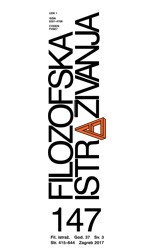Filozofska osnova Parmenidova stiha
Philosophical Groundwork of Parmenides’ Verse
Author(s): Željko Kaluđerović, Ana MiljevićSubject(s): Metaphysics, Ancient Philosphy, Ontology
Published by: Hrvatsko Filozofsko Društvo
Keywords: Parmenides; didactic poem; being (τὸ ὄν); speech; Homer; Hesiod;
Summary/Abstract: Parmenides’ poem Περὶ φύσεως signifies a path in the “temple” of philosophy, in the place where the truth of being (τὸ ἐὸν) happens. The aim of this paper is to argue that Parmenides’ verse is a freely and intentionally chosen to be philosophical, despite containing the elements of Hesiod’s Theogony, Homer’s Iliad and Odyssey, and the elements of Orphic-Pythagorean school. The paper thus investigates the understanding of language in the Hellenic period before Parmenides. It shows that Parmenides took over Homer’s distinction of the speech of gods and the speech of people, not only with respect to the content of his philosophy, but also through its form, namely at the level of pronouncing. At the same time, Parmenides opposed the necessity and the imperative of thinking and speaking of that “What Is”, and Hesiod’s differentiation of false and true speech with arbitrary choice of muse. In that sense, the paper considers Xenophanes’ critique of Homer’s and Hesiod’s tradition, and it determines its importance for the Parmenides’ choice of didactic epic. The basic idea of this epic is the need to express φύσις in a new way of understanding – as an eternal, unchangeable, homogeneous being − through the hexameter of the Ionian dialect. This interpretation opens up a possibility of reading Parmenides’ “the way of truth” and “the way of opinion” as one coherent whole, i.e. as the parts of one poem which are not mutually exclusive.
Journal: Filozofska istraživanja
- Issue Year: 37/2017
- Issue No: 03/147
- Page Range: 597-613
- Page Count: 17
- Language: Croatian

